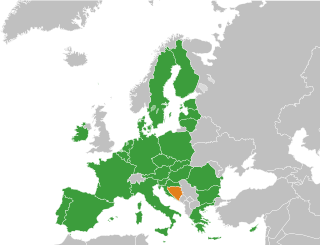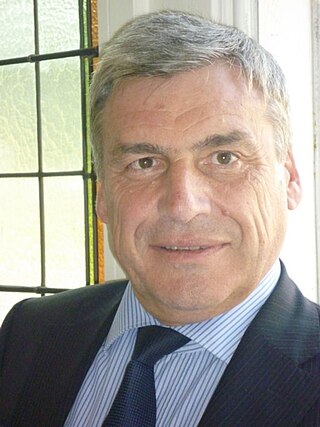
The European Union (EU) is a supranational political and economic union of 27 member states that are located primarily in Europe. The Union has a total area of 4,233,255 km2 (1,634,469 sq mi) and an estimated total population of over 448 million. The EU has often been described as a sui generis political entity combining the characteristics of both a federation and a confederation.

The Treaty on European Union, commonly known as the Maastricht Treaty, is the foundation treaty of the European Union (EU). Concluded in 1992 between the then-twelve member states of the European Communities, it announced "a new stage in the process of European integration" chiefly in provisions for a shared European citizenship, for the eventual introduction of a single currency, and for common foreign and security policies, and a number of changes to the European institutions and their decision taking procedures, not least a strengthening of the powers of the European Parliament and more majority voting on the Council of Ministers. Although these were seen by many to presage a "federal Europe", key areas remained inter-governmental with national governments collectively taking key decisions. This constitutional debate continued through the negotiation of subsequent treaties, culminating in the 2007 Treaty of Lisbon.

The Common Foreign and Security Policy (CFSP) is the organised, agreed foreign policy of the European Union (EU) for mainly security and defence diplomacy and actions. CFSP deals only with a specific part of the EU's external relations, which domains include mainly Trade and Commercial Policy and other areas such as funding to third countries, etc. Decisions require unanimity among member states in the Council of the European Union, but once agreed, certain aspects can be further decided by qualified majority voting. Foreign policy is chaired and represented by the EU's High Representative, currently Josep Borrell.

Danuta Maria Hübner is a Polish politician and Diplomat and Economist and Member of the European Parliament. She has served as European Commissioner for Regional Policy from 22 November 2004 until 4 July 2009, when she resigned to become a Member of European Parliament for the Civic Platform. In 2012, Professor Hübner became a member of the International Honorary Council of the European Academy of Diplomacy.

Stavros Lambrinidis is a Greek lawyer and politician, currently serving as Ambassador of the European Union to the United Nations. He was previously Ambassador of the European Union to the United States from March 2019 until December 2023, European Union special representative for human rights from 2012 to 2019 and Minister for Foreign Affairs in Greece from June 2011 to November 2011.
CEPOL, officially the European Union Agency for Law Enforcement Training, is an agency of the European Union dedicated to training law enforcement officials. The institution was founded in 2000 and adopted its current legal mandate on 1 July 2016. It is based in Budapest, Hungary.

The Southeast European Cooperative Initiative (SECI) is a multilateral regional initiative that has been initiated by the European Union, the United States of America and the countries of Southeast Europe within the framework of the Organization for Security and Cooperation in Europe (OSCE) as a support to the implementation of the Dayton Accords in December 1996 at the inaugural session at Geneva on the basis of Final Points of Common EU-USA Understanding.

The European University Institute (EUI) is an international postgraduate and post-doctoral research-intensive university and an intergovernmental organisation with juridical personality, established by its founding member states to contribute to cultural and scientific development in the social sciences, in a European perspective. Its main campus is located in the hills above Florence in Fiesole, Italy.

The energy policy of the European Union focuses on energy security, sustainability, and integrating the energy markets of member states. An increasingly important part of it is climate policy. A key energy policy adopted in 2009 is the 20/20/20 objectives, binding for all EU Member States. The target involved increasing the share of renewable energy in its final energy use to 20%, reduce greenhouse gases by 20% and increase energy efficiency by 20%. After this target was met, new targets for 2030 were set at a 55% reduction of greenhouse gas emissions by 2030 as part of the European Green Deal. After the Russian invasion of Ukraine, the EU's energy policy turned more towards energy security in their REPowerEU policy package, which boosts both renewable deployment and fossil fuel infrastructure for alternative suppliers.

The accession of Bosnia and Herzegovina to the European Union (EU) is the stated aim of the present relations between the two entities. Bosnia and Herzegovina has been recognised by the European Union as a "candidate country" for accession since the decision of the European Council in 2022 and is on the current agenda for future enlargement of the EU. Bosnia and Herzegovina takes part in the Stabilisation and Association Process and trade relations are regulated by an Interim Agreement.

The European Security and Defence College (ESDC) is an EU body embedded in the External Action Service (EEAS) of the European Union (EU) that provides training and education at EU level in the field of the Common Security and Defence Policy (CSDP), which is part of the EU's Common Foreign and Security Policy (CFSP). The ESDC has limited legal capacity.
The European Policy Institutes Network (EPIN) is a network of 31 think tanks from most EU member states and beyond. Its main focus is on current EU and European political and policy debates. EPIN aims to contribute to the debate on the future of Europe through up to the minute, expert analysis and commentary and through providing easy access to understanding the different national debates. EPIN is coordinated by the Centre for European Policy Studies in Brussels, Belgium.

The Riga Graduate School of Law in Riga, Latvia is an autonomous law school in the Baltic region offering Bachelor, Master and Doctoral studies. It was established in 1998 through an international agreement between the Governments of Sweden and Latvia and the Soros Foundation.

Ambassador Jean De Ruyt retired from the Belgian diplomatic service in March 2012 after some 40 years. Now an independent consultant and political analyst Jean De Ruyt currently consults for Covington & Burling LLP as Senior Advisor and for other consulting firms for EU affairs and security issues. He is a member of the Belgian Royal Academy and co-chair of the Europe-Asia Center.
The Centre for Studies on Federalism (CSF) was established in November 2000 with the primary purpose of studying and researching the theory and practice of Federalism both as a political doctrine and in its implementation in the institutional systems of the Modern state. CSF's main focus is on the infra-national, macro-regional and global scale of federalism: it specifically considers regional integration at a time of globalisation, with special reference to Europe, its history and civilization, its progress towards unification and its future.
The European Union (EU) Centre in Singapore is part of a global network of European Union Centres of Excellence. Following the launch of EU Centres of Excellence in the US and Canada in 1998, there are now 37 Centres located in Australia, Canada, Hong Kong, Japan, Macao, New Zealand, Russia, South Korea, Taiwan and the United States.
Sea transport accounts for most of the European Union's external and internal commerce. The EU is the world's third-largest importer of fisheries and aquaculture products and the fifth-largest producer. Maritime borders make up more than 70% of the Union's external borders, and hundreds of millions of travelers pass through European ports each year. The security of Europe's energy supply is heavily reliant on marine transit and infrastructure. The significant expansion of EU Member States' fleets, as well as suitable port infrastructure, contribute to a well-functioning energy market and supply security, and hence to European residents' and the European economy's overall well-being. The Arctic region is therefore a vital new area for the EU to work towards and a new strategy for the Arctic region that matches with the European Green deal was established in late 2021.

Ramona Nicole Mănescu is a Romanian politician and lawyer. From 24 July 2019 to 4 November 2019, she served as minister of Foreign Affairs in the Romanian Government. She was a Member of the European Parliament serving 2007 to 2013 and 2014 to 2019 from the National Liberal Party, active within the European People's Party. As part of this group she is a member of the European Parliament Committee on Foreign Affairs, vice-chair in the Delegation for relations with the Mashreq countries and a substitute member in the Committee on transport and tourism and in Delegation for relations with the Arab Peninsula.

The European Union (EU) Environmental Policy was initiated in 1973 with the "Environmental Action Programme" at which point the Environmental Unit was formed. The policy has thereafter evolved "to cover a vast landscape of different topics enacted over many decades" (Reuters) and in 2015 the Institute for European Environmental Policy estimated that "the body of EU environmental law" amounted to 500+ directives, regulations and decisions.
"Over the past decades the European Union has put in place a broad range of environmental legislation. As a result, air, water and soil pollution has significantly been reduced. Chemicals legislation has been modernised and the use of many toxic or hazardous substances has been restricted. Today, EU citizens enjoy some of the best water quality in the world"
The United Kingdom Common Frameworks are a group of legislative and non- legislative policies that aim to create UK wide frameworks and ensure the security and integrity of the UK internal market.











